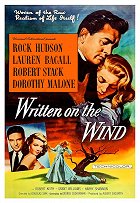Regie:
Detlef SierckDrehbuch:
George ZuckermanKamera:
Russell MettyMusik:
Frank SkinnerBesetzung:
Rock Hudson, Lauren Bacall, Robert Stack, Dorothy Malone, Robert Keith, Grant Williams, Robert J. Wilke, John Larch, Roy Glenn, Maidie Norman (mehr)Inhalte(1)
Die texanische Familie Hadley ist durch Ölförderung reich geworden. Das hat sie allerdings nicht glücklich gemacht. Während Kyle Hadley ein Alkoholproblem hat, schläft seine Schwester Marylee wahllos mit jedem Mann, der sich an sie herantraut. Einzig Mitch Wayne führt ein Leben ohne Laster. Der Ölingenieur Mitch Wayne macht die Bekanntschaft der Werbemanagerin Lucy Moore und verliebt sich in sie. Bald stellt er Lucy seinem besten Freund Kyle Hadley vor. Kyle stammt aus einer steinreichen Ölfamilie, in der auf Wunsch von Kyles Vater auch Mitch aufgewachsen ist. Doch bevor Mitch Lucy seine Gefühle gestehen kann, verliebt sich die kühle Schönheit in Kyle. Für sie steckt hinter der Fassade aus Zynismus ein liebenswerter, psychisch angeschlagener großer Junge. Kyles Probleme, die er in Alkohol ertränkt, rühren daher, dass sein strenger Vater den lebenstüchtigen, klugen Mitch seinem Sohn immer vorgezogen hat. Lucy und Kyle heiraten. Und sehr zur Freude seines Vaters kommt Kyle nach den langen Flitterwochen verwandelt zurück.
Er hat das Trinken aufgegeben und wünscht sich nichts sehnlicher als ein Kind für die junge Ehe. Doch im Haus der Hadleys sät Kyles Schwester Marylee schon bald Zwietracht. Ihr ist schnell klar, dass Mitch, der Mann, den sie seit Kindertagen verzweifelt und unerwidert liebt, seinerseits in Lucy verliebt ist. Marylees Eifersucht, ihr Alkoholismus und ihre Sexeskapaden bringen die gespannten Familienangelegenheiten ins Wanken. Doch vollends aus dem Ruder läuft das Familienleben erst, als Kyle von seinem Arzt die Diagnose gestellt bekommt, vermutlich keine Kinder zeugen zu können, und seine Frau Lucy dennoch schwanger wird. Das öffnet Misstrauen Tür und Tor.
(arte)
Kritiken (4)
Zwei beste Freunde – einer von ihnen ist reich und unglücklich, der andere ausgeglichen und sympathisch. Und dazu zwei Frauen. Ein traditionelles Melodrama (so etwas wie die Serie Dallas) in einer Hollywood-Glitzerverpackung. Im Rahmen des Genres kann man nichts kritisieren, es ist aber eher ein kitschiger Film zum Entspannen für Hausfrauen als eine geistreiche Film-Siesta.
()
Melodrama is not a psychological drama. In it, hearts beat, tears flow, confessions hit the wall of misunderstanding, and male vanity demands satisfaction. Love, hatred, pain, and joy are sold in large packages. And in the case of Douglas Sirk, in quite luxurious packaging. After all, he is the most significant specialist in the genre of 1950s American cinema. This film has a star-studded cast, and those who enjoy melodrama will most likely not be disappointed. Personally, I can say that it would take me a long time to search my memory for a melodramatic film that moved me - and Written on the Wind would definitely not be it. Overall impression: 40%.
()
The enormous asset of this film is neither Rock Hudson, Robert Stack, nor Lauren Bacall, but Dorothy Malone, who is simply fascinatingly repulsive in her role. Excellently performed, and it's worth watching the movie just because of her. I love movies that are about self-destruction, but this one didn't quite impress me as much as I expected.
()
A guy met a guy... and then a girl interfered in their relationship. Roughly two-thirds of the way into the film, I realised that Sirk’s Written on the Wind isn’t so much a traditional heterosexual romance as it is an almost western duel between two men, friends for life and in death, whose frustrations (of different origins) gave rise to a weakness for guns and alcohol rather than members of the opposite sex. Women are their downfall. It’s possible that I’m completely missing the mark, but I’m trying to understand why (because of my delayed recognition of the creative intention) the film completely left me cold emotionally (which doesn’t happen to me very often with melodramas). In spite of that, however, I admired the pleasant directness of the storytelling from the beginning, as well as the ambiguity of the dialogue, the expressive language of the Technicolor hues (which stand in for more graphic erotic material) and the unmissable phallic symbolism, i.e. mostly indications of Sirk’s theatre background and his ability to connect the characters with the mise-en-scéne. However, his experience from the theatre does not explain the several brilliantly edited sequences (the father’s death) or the use of subjectivising camera angles that make us sympathise with the supposed villain, which are evidence of Sirk’s exceptionalism as a film director. I consider the final stroking of the model of an oil derrick, representing the phallus of the complex-ridden male protagonists as well as American society at the time, as clear proof of Sirk’s affiliation with the classic-era Hollywood “smugglers” who inserted rather subversive messages into stories that appeared to be so innocent on the surface. 75%
()
Galerie (33)
Photo © Universal Pictures


Werbung